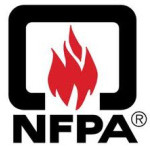- Industry: Fire safety
- Number of terms: 98780
- Number of blossaries: 0
- Company Profile:
Established in 1896, NFPA's mission is to reduce the worldwide burden of fire and other hazards on the quality of life by providing and advocating consensus codes and standards, research, training, and education.
Those plastics not in packaging or coverings that absorb water or otherwise appreciably retard the burning hazard of the commodity. (Paper wrapped or encapsulated, or both, should be considered exposed. )
Industry:Fire safety
The solid cone that extends out from the detector within which the effective sensitivity of the detector is at least 50 percent of its on-axis, listed, or approved sensitivity.
Industry:Fire safety
Waste that is potentially damaging to the environment or human health due to its toxicity, ignitability, corrosivity, or chemical reactivity or another cause.
Industry:Fire safety
Those arrays where collapse, spillage of contents, or leaning of stacks across flue spaces occurs soon after initial fire development.
Industry:Fire safety
Volume enclosed by the building elements around the protected enclosure, minus the volume of any permanent impermeable building elements within the enclosure.
Industry:Fire safety
Those areas that are not unsettled wilderness or uninhabitable territory but are sparsely populated with densities below 500 persons per square mile.
Industry:Fire safety
Weight supported by the life safety rope and system components that must not be exceeded.
Industry:Fire safety
To make extensive repairs in order to restore a component to like-new condition in accordance with the original manufacturer’s specifications.
Industry:Fire safety
Wiring that enters or leaves an equipment enclosure and, under normal operating conditions of the equipment, is not capable, due to arcing or thermal effects, of igniting the flammable gas-air, vapor-air, or dust-air mixture. Normal operation includes opening, shorting, or grounding the field wiring.
Industry:Fire safety
Those special care units, intensive care units, coronary care units, angiography laboratories, cardiac catheterization laboratories, delivery rooms, operating rooms, postanesthesia recovery rooms, emergency departments, and similar areas in which patients are intended to be subjected to invasive procedures and connected to line-operated, patient-care-related electrical appliances.
Industry:Fire safety
